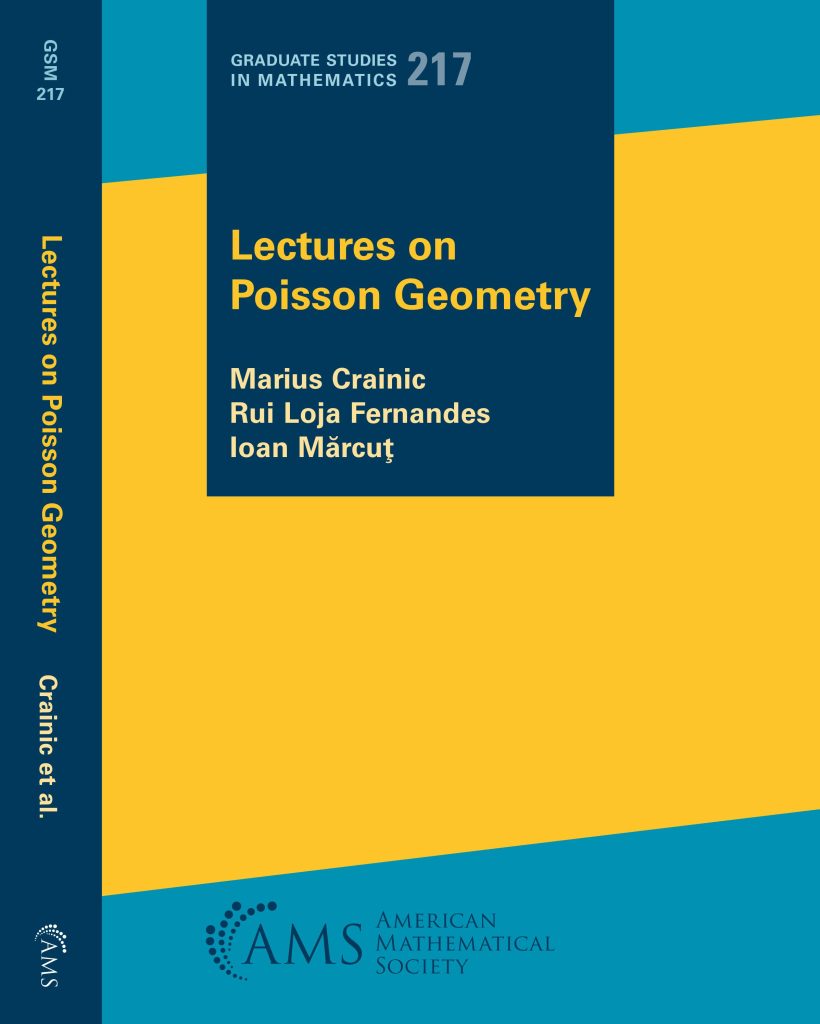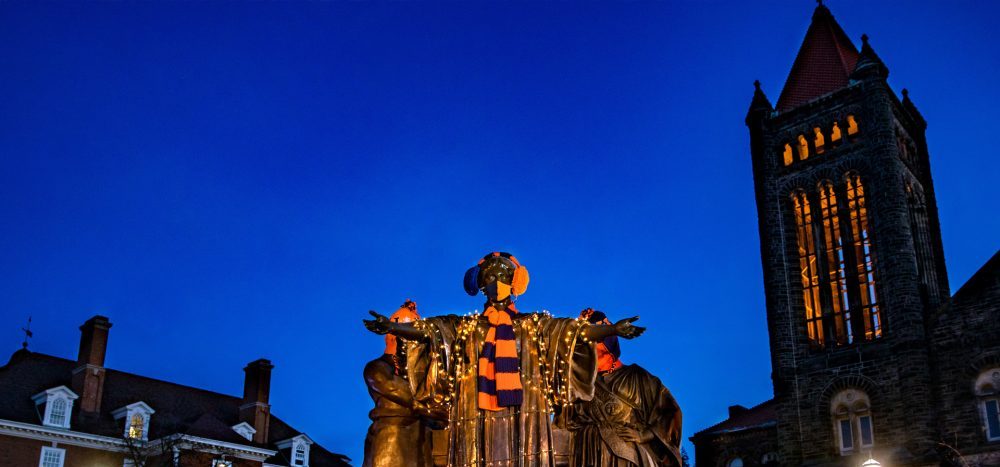I have included this section in my homepage for two reasons: (i) if you wish to find about people that I mentored (browse below) and (ii) in case you are considering working with me. The latter can mean any of the following:
- you are thinking taking a course with me;
- you are considering me as an adviser;
- you are considering me as a mentor for a post-doc;
In any of these cases, you should read first the two sections below on my mathematical interests and teaching philosophy, and then refer to the appropriate section that applies to your situation.
What are my mathematical interests?
My mathematical interests concentrate in geometry, an area of mathematics that roughly speaking studies the shape of space. Geometry has many incarnations and is related with many other areas of mathematics and the physical sciences. You probably have a rough idea of what geometry is, or you can google many sites that will give you some nice overviews of many aspects of geometry (try, for example, to search geometry in MathWorld or PlanetMath, using the facility on the top of this page).
I am specially interested in Poisson geometry. This is a branch of geometry that grew out of the study of mechanical systems, such as the solar system, spinning tops, etc. If you have a basic knowledge of manifolds, vector fields and differential forms, you can learn about Poisson geometry in the book that I coauthored (click on image):

What is my teaching philosophy?
I believe that mathematics is, in the first place, solving problems. Note that by solving I don’t mean applying some known algorithm that someone else developed (the person that created that algorithm is the one that has solved a problem!). I would say that a “big theorem” is one that solves a deep problem, and identifying (deep) problems is an important part of mathematics. Note, also, that deep does not necessarily mean difficult. In fact, my experience tells me that when something looks difficult is because we have not understood the problem properly.
This said, let me emphasize right away that teachers are not dispensable, quite the opposite (I have many doubts about such things as e-learning, etc.). Going to the lectures and attending classes is an essential part of learning mathematics. In the lecture you can witness a certain way of looking at a problem, you can experience the first difficulties in solving a problem, and you can learn how others have solved problems (yes, mathematics have been around for quite sometime!).
The role of a teacher and an adviser, in my opinion, is to point the student to interesting problems and lead him through the problems. It is not the role of the advisor to give the student clues on how to solve the problems (and much less to solve the problems). Mathematics can only progress when the students end up knowing more math than their teachers.
Taking a course with me…
If you are planning to take a course with me be prepared to solve a lot of problems! If you are taking a basic linear algebra or calculus course and you just want to learn some algorithms, you will be loosing your time going to my classes. I believe it is important to understand things. Also, if you just like “the theory” and you don’t like to fight with problems, don’t take a class with me. Finally, beware that I don’t like students who cannot meet deadlines.
Doing a small research project with me…
If you are an undergraduate student and you would like to do a small research project with me, to experience what research is all about, you should:
- read the sections above about my teaching philosophy and my mathematical interests. The project that I will offer you will reflect this.
- be prepared to learn about some significant result in geometry (most likely, you will have to read a book or a research paper).
- be prepared to write an original project: if it does not necessarily contain original mathematics, it should have, at least, an original presentation.
- set up an appointment with me (e-mail me).
Here is a list of research projects that some students did under my supervision:
- João Guerreiro, Orbifolds and Wallpaper Patterns
- Pedro Vitória, A Quantização de Kontsevich (in Portuguese)
- Ricardo Joel Andrade, Esferas Exóticas (in Portuguese)
- Ricardo Gonçalves, Grupos não-Realizáveis por Transformações Lineares (in Portuguese)
I also had some Master students, which had already some good Math training, and did some more advanced research projects (some are old and I don’t have copies):
- Shuyu Xiao, Van Est proof of Lie’s Third Theorem
- Luís Alexandre Pereira, Integrability of Lie algebroids by proper groupoids
- Ricardo Joel Andrade, The h-principle
- João Boavida, Singular foliations and Lie algebroids
- João Paulo Santos, Integrable systems and algebraic geometry
- António Serra, Quadratic Poisson brackets on Lie groups
Becoming a PhD student with me…
A person should only pursue a PhD in Mathematics if he/she loves mathematics. Getting a good job in Mathematics can be quite hard. Teaching mathematics and doing research in mathematics require dedication and hard work. There are better paid jobs around which require less effort… Also, at some point one should think what one is doing in mathematics. If you are wondering about this question you may want to read the article What is good mathematics? by Fields Medalist winner Terence Tao.
At Illinois you have the chance to study mathematics in a top level university, with a PhD degree in Mathematics of high international standards. This means that our PhD program gives both an in depth and in breath preparation in Mathematics. Be ready to take preliminary and qualifying exams. If you become a student of mine, be prepared to take coursework in areas not directly related to your thesis project. I will force you to do so, even if you are not required to!
A PhD student should have a good thesis problem. What do I mean by this? I have two main properties in mind:
- It should be an interesting problem. This means that it should have many connections with other (interesting) problems both in the field and outside the field. At the same time, it should involve a nice piece of mathematics that already exists out there (and that it will prove useful for the student later in his life).
- It should be a flexible problem. This means that the problem should admit partial solutions, rather than a Yes/No answer, and leaving a lot of room for further work. Also, it should be possible to test it, saying by looking at interesting examples.
My job as an adviser, besides identifying a good thesis problem, is to let the student know what is going on in the field, and to the let the people in the field know what is going on with the student (for this, the student will have to do something, of course!). If the student does a good job, this will give him/her a good start.
I am a mentor to both predoctoral and doctoral students in the National Alliance for Doctoral Studies in the Mathematical Sciences
Current and previous PhD students:
- Aline Leite, PhD student at UIUC (2021 – —)
- Ning Jiang, PhD student at UIUC (2021 – —)
- Wilmer Smilde, PhD student at UIUC (2021 – —)
- Sambit Senapati, PhD student at UIUC (2020 – —)
- Shuyu (Sonya) Xiao, Abelianization of Groupoids and Lie algebroids (graduated from UIUC in May 2024)
- Luka Zwaan, Duistermaat-Heckman measures for Hamiltonian Groupoid actions (graduated from UIUC in May 2024)
- Yuxuan (Yuki) Zhang, Local symplectic groupoids and the SGA equation (graduated from UIUC in May 2022)
- Joel Villatoro Stacks in Poisson geometry (graduated from UIUC in August 2018)
- Daan Michaels Symplectic Foliations, Currents and Local Groupoids (graduated from UIUC in April 2018)
- Hassan Najafi Alishah, KAM Theory, Presymplectic Dynamics and Lie algebroids (graduated from IST in December 2012)
- Juan Pablo Roggiero, Lie Algebroids over Quotient Spaces (graduated from IST in September 2011)
- Pedro Frejlich, h-principles around Poisson Geometry (graduated from IST in June 2011)
- Ivan Struchiner, The Classifying Lie Algebroid of a Geometric Structure (graduated from UNICAMP, Brazil, in January 2009)
Doing a postdoc with me…
If you are considering a post-doctoral position at UIUC, possibly under my supervision, you should start by taking a look at the web pages of the department (look at what the other faculty is doing, at seminars being offered, and other research activities in the Math Department). Remember, a post-doc is to help your own research career take off. It is not a way to get another advisor for 3 more years!
Current and previous post-doctoral fellows:
- Florian Zeiser (Poisson Geometry), J. L. Doob Research Assistant Professor at UIUC
- Ivan Contreras (Mathematical Physics), currently at Amherst College, Massachusetts
- Ioan Marcut (Poisson geometry), currently at Radboud University Nijmegen, The Netherlands
- Matias del Hoyo (Algebraic topology and Lie groupoids), currently at IMPA, Brazil
- Florian Schaetz (Poisson geometry), currently at the Centre for Quantum Geometry of Moduli Spaces, Aarhus, Denmark
- Olivier Brahic (Poisson geometry), currently at Universidade Federal do Paraná, Curitiba, Brazil
- Philippe Monnier (Poisson geometry), currently at Université de Toulouse, France
- Iakovos Androulidakis (Lie algebroids and Lie groupoids), currently at University of Athens, Greece
- David Martinez Torres (symplectic, contact and Poisson geometry), currently at Universidad Politécnica de Madrid, Spain

